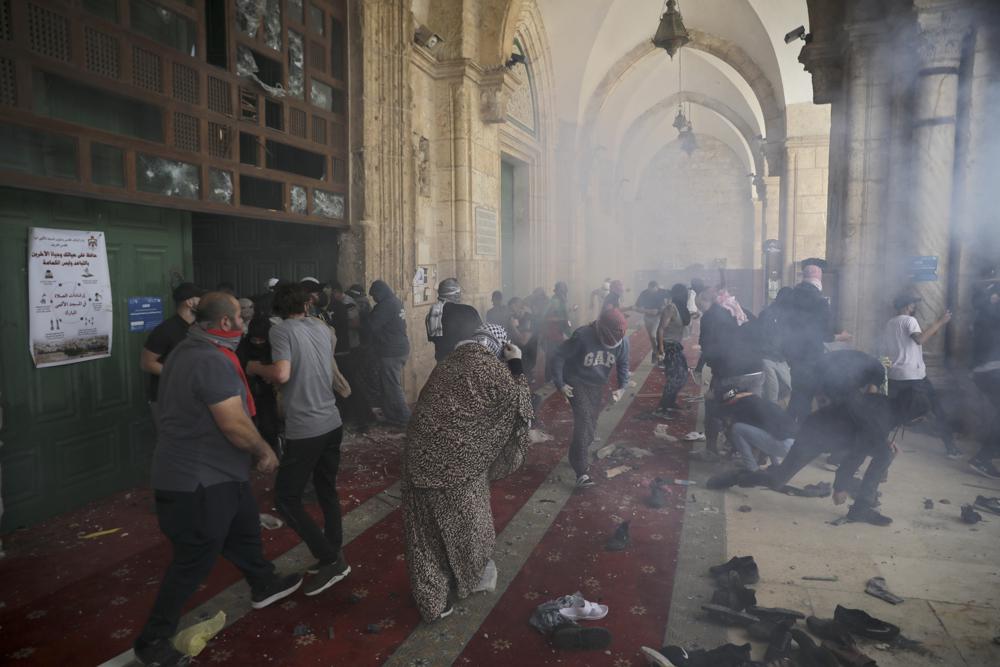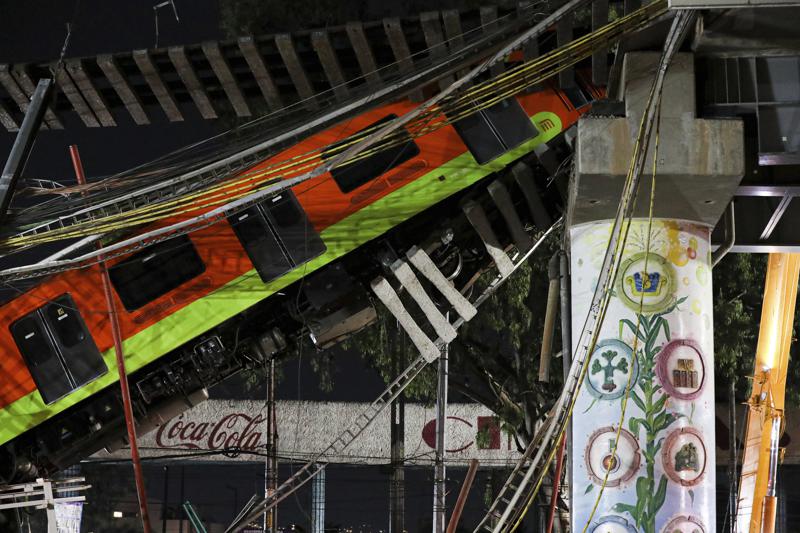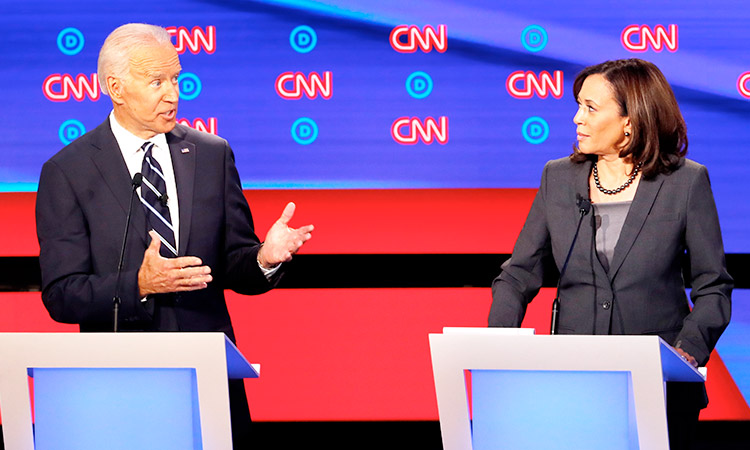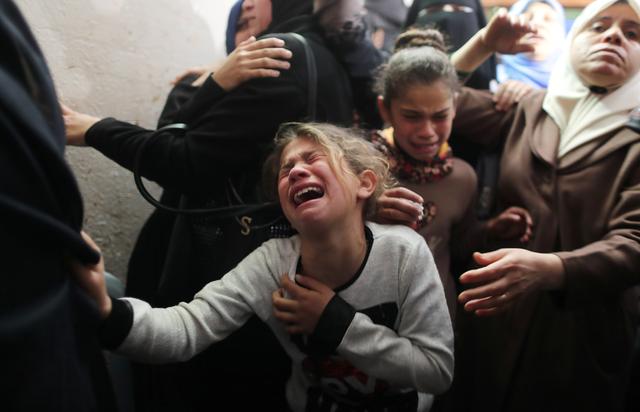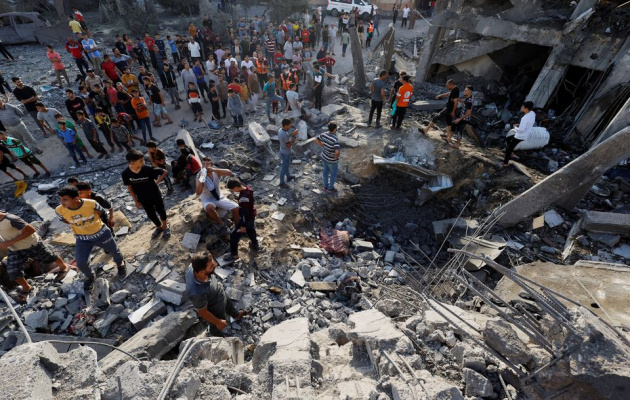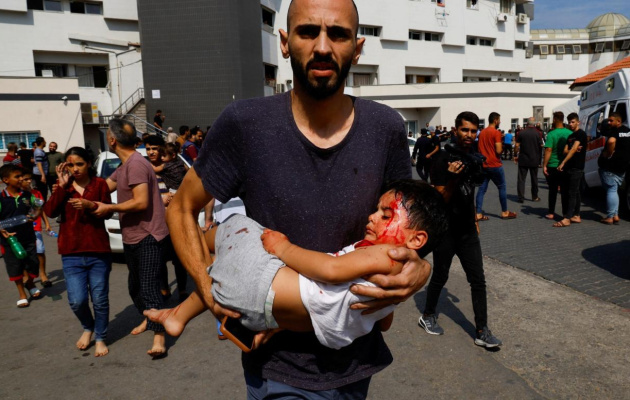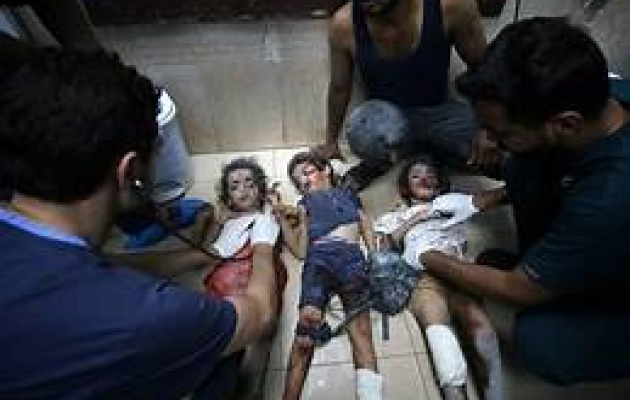Home
Over 300 Palestinians hurt in Jerusalem holy site clash
- Details
- Written by northsouth
- Category: content
- Hits: 1360
By ILAN BEN ZION
JERUSALEM — Israeli police firing tear gas, stun grenades and rubber bullets clashed with stone-throwing Palestinians at a flashpoint Jerusalem holy site on Monday, the latest in a series of confrontations that threatened to push the contested city toward wider conflict.
More than a dozen tear gas canisters and stun grenades landed in the Al-Aqsa mosque, located in a compound sacred to both Jews and Muslims, said an Associated Press photographer at the scene. Smoke rose in front of the mosque and the iconic golden-domed shrine on the site, and rocks littered the surrounding plaza. Inside one area of the compound, shoes and debris lay scattered over ornate carpets.
More than 305 Palestinians were hurt, including 228 who went to hospitals and clinics for treatment, according to the Palestinian Red Crescent. Seven of the injured were in serious condition. Police said 21 officers were hurt, including three who were hospitalized.
Monday’s confrontation was the latest after weeks of mounting tensions between Palestinians and Israeli troops in the Old City of Jerusalem, the emotional center of their conflict. The clashes have come during the Muslim holy month of Ramadan, already a time of heightened religious sensitivities.
Most recently, the tensions have been fueled by an eviction plan in an Arab neighborhood of east Jerusalem where Israeli settlers have waged a lengthy legal battle to take over properties.
Hundreds of Palestinians and about two dozen police officers have been hurt over the past few days in clashes at the sacred compound, which is known to Jews as the Temple Mount and to Muslims as the Noble Sanctuary. The compound, which, has been the trigger for rounds of Israel-Palestinian violence in the past, is Islam’s third-holiest site and considered Judaism’s holiest.
An AP photographer at the scene said that early Monday morning, protesters had barricaded gates to the walled compound with wooden boards and scrap metal. Sometime after 7. a.m., clashes erupted, with those inside throwing stones at police deployed outside. Police entered the compound, firing tear gas, rubber-coated steel pellets and stun grenades.
At some point, about 400 people, both young protesters and older worshippers, were inside the carpeted Al-Aqsa Mosque. Police fired tear gas and stun grenades into the mosque.
Police said protesters hurled stones at officers and onto an adjoining roadway near the Western Wall, where thousands of Israeli Jews had gathered to pray.
After several days of Jerusalem confrontations, Israel has come under growing international criticism for its heavy-handed actions at the site, particularly during Ramadan.
The U.N. Security Council scheduled closed consultations on the situation Monday.
Late Sunday, the U.S. National Security Adviser Jake Sullivan spoke to his Israeli counterpart, Meir Ben-Shabbat. A White House statement said that Sullivan called on Israel to “pursue appropriate measures to ensure calm” and expressed the U.S.’s “serious concerns” about the ongoing violence and planned evictions.
Prime Minister Benjamin Netanyahu pushed back against the criticism Monday, describing Israel’s actions in Jerusalem as a law-and-order issue. Netanyahu said Israel is determined to ensure the rights of worship for all and that this “requires from time to time stand up and stand strong as Israeli police and our security forces are doing now.”
Ofir Gendelman, a spokesman for Netanyahu, claimed in a tweet that “extremist Palestinians planned well in advance to carry out riots” at the holy site, sharing photos of mounds of stones and wooden barricades inside the compound.
Ayman Odeh, a leading Arab politician in Israel, blamed the violence on Israel’s discriminatory policies toward the Palestinians and said it had provoked the violence. “Wherever you find occupation, you will find resistance,” he said at a news conference in Sheikh Jarrah, near the homes whose residents are under threat of eviction.
In other violence, Palestinian protesters hurled rocks at an Israeli vehicle driving just outside the Old City walls. The driver later told public broadcaster Kan that his windows were smashed by stones and pepper spray shot into the car as he drove past the Old City. CCTV footage of the incident released by the police showed a crowd surrounding the car and pelting it with rocks, its rear window shattered, when it swerved off the road and into a stone barrier and a bystander.
Police said two passengers were injured.
The day began with police announcing that Jews would be barred from visiting the holy site on what Israelis mark as Jerusalem Day, with a flag-waving parade through the Old City that is widely perceived by Palestinians as a provocative display in the contested city. The marchers celebrate Israel’s capture of east Jerusalem in the 1967 Mideast war.
In that conflict, Israel also captured the West Bank and Gaza Strip. It later annexed east Jerusalem and considers the entire city its capital. The Palestinians seek all three areas for a future state, with east Jerusalem as their capital.
Police have allowed the Jerusalem Day parade to take place despite growing concerns that it could further inflame tensions after violence has occurred almost nightly throughout Ramadan.
It began when Israel blocked off a popular spot where Muslims traditionally gather each night at the end of their daylong fast. Israel later removed the restrictions, but clashes quickly resumed amid tensions over the planned eviction of Palestinians from the Arab neighborhood of Sheikh Jarrah.
Israel’s Supreme Court postponed a key ruling Monday that could have forced dozens of Palestinians from their homes, citing the “circumstances.”
The Israeli crackdown and planned evictions have drawn harsh condemnations from Israel’s Arab allies and expressions of concern from the U.S., European Union and United Nations.
The tensions in Jerusalem have threatened to reverberate throughout the region.
Palestinian militants in the Gaza Strip have fired several barrages of rockets into Israel, and protesters allied with the ruling Hamas militant group have launched dozens of incendiary balloons into Israel, setting off fires across the southern part of the country.
“The occupier plays with fire, and tampering with Jerusalem is very dangerous,” Saleh Arouri, a top Hamas official, told the militant group’s Al-Aqsa TV station.
In response, COGAT, the Israeli Defense Ministry organ responsible for crossings with the Gaza Strip, announced Monday that it was closing the Erez crossing to all but humanitarian and exceptional cases until further notice.
Mexico City metro overpass collapses onto road; 23 dead
- Details
- Written by northsouth
- Category: content
- Hits: 1377
By E. EDUARDO CASTILLO
MEXICO CITY - An elevated section of the Mexico City metro collapsed and sent a subway car plunging toward a busy boulevard late Monday, killing at least 23 people and injuring about 70, city officials said. Rescuers initially searched a car left dangling from the overpass for anyone who might be trapped.
Those efforts were suspended early Tuesday, however, because of safety concerns for those working near the precariously dangling car. A crane was brought in to help shore it up.
“We don’t know if they are alive,” Mayor Claudia Sheinbaum said of the people possibly trapped inside the car following one of the deadliest accidents for the city’s subway system, which is among the busiest in the world.
Earlier Sheinbaum said someone had been pulled alive from a car that was trapped on the road below. She said 49 of the injured were hospitalized, and that seven were in serious condition and undergoing surgery.
“There are unfortunately children among the dead,” Sheinbaum said, without specifying how many.
The overpass was about 5 meters (16 feet) above the road in the borough of Tlahuac, but the train ran above a concrete median strip, which apparently lessened the casualties among motorists on the road below.
“A support beam gave way” just as the train passed over it, Sheinbaum said.
The Mexico City Metro has had at least two serious accidents since its inauguration half a century ago. In March of last year, a collision between two trains at the Tacubaya station left one passenger dead and injured 41 people. In 2015, a train that did not stop on time crashed into another at the Oceania station, injuring 12.
Hundreds of police officers and firefighters cordoned off the scene Tuesday as desperate friends and relatives of people believed to be on the train gathered outside the security perimeter. Despite the fact that the coronavirus situation remains serious in Mexico City, they crowded together as they waited for news.
Adrián Loa Martínez, 46, said that his mother called him to tell him that his half-brother and sister-in-law were driving when the overpass collapsed and that beam fell onto their car.
He said that his sister-in-law was rescued and sent to a hospital, but that his half-brother José Juan Galindo was crushed and he feared he was dead. “He is down there now,” he told journalists pointing toward the site.
Gisela Rioja Castro, 43, was looking for her husband, 42-year-old Miguel Ángel Espinoza. She said that her husband always take that train after finishing work at a store, but he never got home and had stopped answering his phone. When she heard what has happened, she immediately feared the worst but has gotten no information from the authorities.
“Nobody knows anything,” she said.
The collapse occurred on the newest of the Mexico City subway’s lines, Line 12, which stretches far into the city’s south side. Like many of the city’s dozen subway lines, it runs underground through more central areas of the city of 9 million, but then runs on elevated concrete structures on the city’s outskirts.
The collapse could represent a major blow for Mexican Foreign Relations Secretary Marcelo Ebrard, who was Mexico City’s mayor from 2006 to 2012, when Line 12 was built. Allegations about poor design and construction on the subway line emerged soon after Ebrard left office as mayor. The line had to be partly closed in 2013 so tracks could be repaired.
Ebrard wrote on Twitter: “What happened today on the Metro is a terrible tragedy.”
“Of course, the causes should be investigated and those responsible should be identified,” he wrote. “I repeat that I am entirely at the disposition of authorities to contribute in whatever way is necessary.”
It was not clear whether a 7.1-magnitude earthquake in 2017 could have affected the subway line.
Global leaders react to Joe Biden's election win
- Details
- Written by northsouth
- Category: content
- Hits: 1426
LONDON - Democrat Joe Biden captured the US presidency on Saturday as voters narrowly rebuffed Republican incumbent Donald Trump's tumultuous leadership and embraced Biden's promise to fight the coronavirus pandemic and fix the economy in a divided nation.
Following are reactions from world leaders: (statements or tweets unless otherwise stated)
CANADIAN PRIME MINISTER JUSTIN TRUDEAU
"On behalf of the Government of Canada, I congratulate Joe Biden and Kamala Harris on their election as the next President and Vice President of the United States of America. Canada and the United States enjoy an extraordinary relationship – one that is unique on the world stage."
"I look forward to working with President-elect Biden, Vice President-elect Harris, their administration, and the United States Congress as we tackle the world's greatest challenges together."
GERMAN CHANCELLOR ANGELA MERKEL
"I look forward to future cooperation with President Biden. Our transatlantic friendship is irreplaceable if we are to master the great challenges of our time."
GERMAN FOREIGN MINISTER HEIKO MAAS
"We look forward to working with the next US administration. We want to invest in our cooperation, for a transatlantic restart and a New Deal."
BRITISH PRIME MINISTER BORIS JOHNSON
"Congratulations to Joe Biden on his election as President of the United States and to Kamala Harris on her historic achievement.
"The US is our most important ally and I look forward to working closely together on our shared priorities, from climate change to trade and security."
FRENCH PRESIDENT EMMANUEL MACRON
"The Americans have chosen their President. Congratulations @JoeBiden and @KamalaHarris! We have a lot to do to overcome today's challenges. Let's work together!"
INDIAN PRIME MINISTER NARENDRA MODI
"Congratulations @JoeBiden on your spectacular victory! As the VP, your contribution to strengthening Indo-US relations was critical and invaluable. I look forward to working closely together once again to take India-US relations to greater heights."
INDIAN PRIME MINISTER NARENDRA MODI, ON KAMALA HARRIS
"Heartiest congratulations @KamalaHarris! Your success is pathbreaking, and a matter of immense pride not just for your chittis, but also for all Indian-Americans. I am confident that the vibrant India-US ties will get even stronger with your support and leadership." (Chittis is the Tamil word for "aunts" that Harris used in her speech while accepting the Democratic Party's nomination for vice president.
PAKISTANI PRIME MINISTER IMRAN KHAN
"Congratulations @JoeBiden & @KamalaHarris. Look forward to President Elect Biden's Global Summit on Democracy & working with him to end illegal tax havens & stealth of nation's wealth by corrupt ldrs. We will also continue to work with US for peace in Afghanistan & in the region."
EUROPEAN UNION COMMISSION PRESIDENT URSULA VON DER LEYEN
"I warmly congratulate Mr Joe Biden on his victory in the US presidential election and look forward to meeting him at the earliest possible opportunity.
"The European Union and the United States are friends and allies, our citizens share the deepest of links...As the world continues to change and new challenges and opportunities appear, our renewed partnership will be of particular importance."
IRISH PRIME MINISTER MICHEAL MARTIN
"I offer warmest congratulations to Joe Biden on his election as the 46th President of the United States. Ireland takes pride in Joe Biden's election, just as we are proud of all the generations of Irish women and Irish men and their ancestors whose toil and genius have enriched the diversity that powers America."
POLISH PRESIDENT ANDRZEJ DUDA
"Congratulations to @JoeBiden for a successful presidential campaign. As we await the nomination by the Electoral College, Poland is determined to upkeep high-level and high-quality PL-US strategic partnership for an even stronger alliance."
UKRAINIAN PRESIDENT VOLODYMYR ZELENSKIY
"Congratulations to @JoeBiden @KamalaHarris! Ukraine is optimistic about the future of the strategic partnership with the United States. Ukraine and the United States have always collaborated on security, trade, investment, democracy, fight against corruption. Our friendship becomes only stronger!"
DUTCH PRIME MINISTER MARK RUTTE
"On behalf of the Dutch cabinet I would like to congratulate @JoeBiden and @KamalaHarris with their election victory after a close race. I am looking forward to continue the strong bond between our countries, and hope to speak with him about these matters soon."
NORWEGIAN PRIME MINISTER ERNA SOLBERG
"On behalf of the Norwegian government, I congratulate Joe Biden on his election victory. The United States is Norway's most important ally and we work closely together in many areas.
"The world needs American leadership to solve the major global challenges. We look forward to cooperating with the Biden administration at the United Nations Security Council, and in efforts to combat the coronavirus pandemic and climate change."
PETER BEYER, GERMAN GOVERNMENT'S TRANS-ATLANTIC COORDINATOR, TOLD REUTERS
"We will have a US President who is interested in Europe and doesn't want to set us against each other."
SPANISH PRIME MINISTER PEDRO SANCHEZ
"The American people have chosen the 46th President of the United States. Congratulations @JoeBiden and @KamalaHarris. We wish you good luck and all the best. We are looking forward to cooperating with you to tackle the challenges ahead of us," he said.
SPANISH FOREIGN MINISTER ARANCHA GONZALEZ LAYA
"Record citizen participation, strong institutions and a President-elect @JoeBiden with a first woman to ever hold the position of Vice-President @KamalaHarris. Looking foward to working together"
GREEK PRIME MINISTER KYRIAKOS MITSOTAKIS
"Congratulations to US President-Elect @JoeBiden. Joe Biden has been a true friend of Greece and I'm certain that under his presidency the relationship between our countries will grow even stronger."
Two mothers killed each hour in Gaza conflict: UN Women
- Details
- Written by northsouth
- Category: News-Reports-Studies
- Hits: 419
THE UNITED NATIONS - Women and children account for roughly 70 per cent of people killed in the war in Gaza, with two mothers killed every hour since hostilities erupted more than 100 days ago, according to a UN Women report published on Friday.
The report examines the gendered impact of the conflict, which has left more than 23,000 Palestinians dead, according to Gazan health authorities, about 16,000 of whom are women or children.
Failure and trauma
“We have seen evidenced once more that women and children are the first victims of conflict and that our duty to seek peace is a duty to them. We are failing them,” UN Women Executive Director Sima Bahous said in a statement issued alongside the report.
“That failure, and the generational trauma inflicted on the Palestinian people over these 100 days and counting, will haunt all of us for generations to come,” she warned.
UN Women also reiterated deep concern over the accounts of unconscionable sexual violence and other gender-based violence during the Hamas-led attacks against Israel on 7 October that sparked the conflict.
The agency called for accountability, justice and support for all those affected and for the immediate and unconditional release of all hostages.
‘Impossible decisions’
UN Women said the Gaza conflict “is fundamentally a protection crisis for women” at a time when nowhere in the enclave is safe.
Of the 1.9 million people now displaced, close to a million are women and girls, and the “impossible decisions” they have to make regarding whether to evacuate – when and how as well as where to go – “are entrenched with gender differentiated fears and experiences", given risks of attacks and harassment while on the move.
UN Women further estimated that at least 3,000 women may have become widows and heads of households, and at least 10,000 children may now be fatherless. As a result, more women fear families will resort to desperate coping mechanisms such as early marriage.
Meanwhile, women’s rights organizations continue to operate amidst the crisis. In November, UN Women conducted a rapid survey of 12 women-led organizations and one youth-led group which found that most – 83 per cent – were at least partially operating, focused mainly on the emergency response.
However, less than one per cent of funding under the 2023 Flash Appeal for Gaza has directly gone to women’s groups.
Staying the course
The report is part of UN Women’s six-month response plan for Gaza, which includes providing emergency food assistance to over 14,000 female-headed households and supporting the distribution of items requested by women on the ground such as clothing, sanitary products and baby formula.
The agency is also partnering with women-led organizations to deliver gender responsive services for gender-based violence, establishing women-led protection and response committees in shelters and convening regular consultations with women’s organizations to discuss the challenges they face.
Main News
latest news
- Mother of Gaza hostage says release deal has to be Netanyahu’s top priority
- Macron dismisses Left candidate who vows to rip up pension reforms
- Kamala Harris opened up marginal two-percentage-point over Trump, polls
- Ukraine destroys Putin’s last railway ferry in Crimea
- Farmers in Africa say their soil is dying and chemical fertilizers are in part to blame
- Hamas and Fatah agree to form a government. What does it mean and who are these Palestinian groups?
- Demonstrators stage mass protest against Netanyahu visit and US military aid to Israel
- IFAD partners with Zenkyoren to issue its first nutrition bond
- South Sudan faces growing humanitarian crisis, warns WHO
- Pressure mounts on Biden as tally of Democrats urging withdrawal passes 30
- Xi Jinping orders ‘all-out’ rescue after Chinese bridge collapses into river, killing 11 people
- Subsidies in industrial supply chains risk distorting global trade
- Millionaires threaten to desert Britain over tax
- Israel kills dozens as it steps up Gaza bombardment
- French police clash with reservoir protesters in La Rochelle
- South African police uncover multi-million dollar meth lab
- Surveys show Chinese economy growing but at modest pace
- Night owls have superior brain function – study
- Clearing Gaza of almost 40m tonnes of war rubble will take years, says UN
- To end hunger we need more investment in rural development and better ways to mobilize funding
- FAD and Senegal partner to increase smallholder farmers’ resilience to external shocks
- Nearly two thirds of Democrats want Joe Biden to quit presidential race, poll
- US probes nearly 70 suspected human cases of H5N1 bird flu
- Gaza: Fresh airstrikes on defenceless Palestinians in centre, south, as conflict intensifies
- The triple planetary crisis: Global Foresight Report reveals global shifts
Europe
Macron dismisses Left candidate who vows to rip up pension reforms
Ukraine destroys Putin’s last railway ferry in Crimea
Millionaires threaten to desert Britain over tax
French police clash with reservoir protesters in La Rochelle
Italian police free 33 Indian farm labourers from 'slavery'
Trends for the next decade of agriculture
US ‘pressuring UK to block ICC’s Netanyahu arrest warrant’
At least 65 whales dead in UK's 'biggest mass stranding in decades'
Empowering the future: how Global Shapers are advancing the youth agenda
France’s leftist coalition demands the right to form a government after fractured parliament vote
Confiscating Russian assets would not break international law — it would safeguard it
EU Internet Referral Unit Transparency Report 2022
Ukrainian air base under frequent fire as Russia aims at F-16 arrivals
French candidates bow out in concerted bid to block far-right
When will we find out the results of the French elections?
Protesters clash with riot police in Paris as far-right party leads France election
What we know about summer COVID as UK case numbers rise
The impacts of long COVID across OECD countries
Cyber Risk Reduction in China, Russia, the US and the EU
German weapons exports on course to hit new record
France votes in election that could hand power to far right
Denmark to charge farmers $100 per cow in world-first meat tax
France saw a rise in all types of racism in 2023, report
Julian Assange released from prison after reaching plea deal with US
Gunmen kill at least 19 in attacks on churches, synagogue in Russia’s Dagestan
Asia
IFAD partners with Zenkyoren to issue its first nutrition bond
Xi Jinping orders ‘all-out’ rescue after Chinese bridge collapses into river, killing 11 people
Surveys show Chinese economy growing but at modest pace
Pakistan's Imran Khan, wife acquitted in unlawful marriage case
China-based inventors lead on global GenAI patents: UN report
A shootout between Pakistani Taliban and Police during a raid kills 6, including 3 officers
Chinese auto exports surge, partly offsetting a sales slump at home
India's Modi on visit to Moscow appreciates 'dear friend' Putin
India's parliament removes parts of opposition leader Rahul Gandhi's speech targeting Modi
Navigating Security Dilemmas in Indo-Pacific Waters
China's Communist Party to hold key third plenum on July 15-18, state media
China warns US it's ready to fight back against restrictions on tech investments
Blaze in South Korea battery plant kills 22 workers
Deadly monsoon landslides in southern Bangladesh displaced around 2,000
Officials highlight massive poverty, humanitarian despair in Afghanistan
China urged to provide information on imprisoned Uyghur doctor
FDI in Asia fell by 8% to $621 billion
PM Modi, IFAD launch $217m program to empower rural communities in Jammu, Kashmir
Philippine officials say Chinese forces seized 2 navy boats in disputed shoal
Malaysian leader Anwar says China a ‘true friend’
Flesh-eating bacteria that can kill in two days spreads in Japan
China beating US on nuclear power by more than a decade, report
EU report shows continuous deterioration of fundamental freedoms in Hong Kong
UN chief condemns escalating violence and civilian attacks in Myanmar
China maintains stance on disputed Gulf islands despite Iran's anger
Africa
Farmers in Africa say their soil is dying and chemical fertilizers are in part to blame
South Sudan faces growing humanitarian crisis, warns WHO
South African police uncover multi-million dollar meth lab
To end hunger we need more investment in rural development and better ways to mobilize funding
FAD and Senegal partner to increase smallholder farmers’ resilience to external shocks
South Sudan faces growing humanitarian crisis, warns WHO
Reducing food loss and waste could reduce emissions
IFAD inaugurates country office in Burkina Faso
At least 22 students killed after school collapses during morning class
Refugees, migrants face violence, abuse and death on routes across Africa, new data shows
Time running short as 2030 deadline looms for UN blueprint for a fairer future
Ecowas tries to prevent junta-led breakup
UN says Rwandan, Ugandan troops are fighting in DR Congo
South Sudan peace talks face collapse over a new security law
Kenya’s president warns of consequences after effort to address an $80 billion debt fails
Stevie Wonder celebrated his 74th birthday by becoming a Ghanaian citizen
Kenya police use tear gas to disperse crowds after call for more demonstrations
UN seeks help for tens of thousands of Sudan refugees fleeing to Libya, Uganda
Ethiopia says it’s ready for foreign firms but investors seem reluctant
Calls for Ruto’s resignation as protests continue in Kenya
US security chiefs issue warning on Niger withdrawal
New concept to prevent Poaching rhinos
OECD and African Union Commission to release Africa’s Development Dynamics 2024
Malawi: Ban on consensual same-sex conduct is a bitter setback for human rights
President Ghazouani holds early lead as Mauritania counts votes
Americas
Kamala Harris opened up marginal two-percentage-point over Trump, polls
Pressure mounts on Biden as tally of Democrats urging withdrawal passes 30
Nearly two thirds of Democrats want Joe Biden to quit presidential race, poll
US probes nearly 70 suspected human cases of H5N1 bird flu
Bullish Biden defies those calling for him to step down
US steps up sanctions against Israeli settlers and ‘outposts’ in occupied West Bank
Biden, NATO members poised to unveil new Ukraine aid at summit
Embattled Biden welcomes NATO allies in Washington
US has sent Israel thousands of 2,000-pound bombs since Oct. 7
Biden's debate performance causes some Democrats to panic
Bolivia coup attempt fails after military assault on presidential palace
Blinken warns Israel against wider war
How Mark Zuckerberg’s Meta Failed Children on Safety, States Say
60 per cent increase in displacement across Haiti: IOM
Furious White House cancels meeting with Netanyahu
Trump's second-term agenda: deportations, trade wars, NATO rethink
Over 70 million people in the US are under heat alerts
Musk and Bezos might be entrusted with America's national security space missions
All the chip companies getting billions in US subsidies
IFAD welcomes Canada’s generous contribution to fight hunger and poverty
Human missions to Mars in doubt after astronaut kidney shrinkage
Majority of Black Americans believe US institutions conspiring against them, poll
Biden, Zelenskiy sign $50bn security loan deal approved by G7 agreement to Ukraine
Inside Melinda French Gates’ $1 billion 'incredible experiment'
Gunman holds bus hostage as wild police chase unfolds in Atlanta
Australia & Pacific
Passionate welcome for WikiLeaks founder Assange as he lands in Australia
Violent protests return to New Caledonia as pro-independence leader extradited
EU and Australia accelerate their digital cooperation
Over 2,000 people thought to have been buried alive in Papua New Guinea landslide
Over 670 people died in a massive Papua New Guinea landslide, UN
Macron says extra security to stay in riot-hit New Caledonia as long as needed
New Caledonia riots: Tourists evacuated, President Macron to visit
Hundreds more French police start deploying to secure New Caledonia
France declares state of emergency in New Caledonia as protests rage
Australia’s 2024 National Defence Strategy
Sydney rocked by second mass stabbing as knifeman attacks bishop
Three dead, 1,000 homes destroyed in Papua New Guinea quake
Australia and UK sign defense and security treaty
Australia tightens student visa rules as migration hits record high
Global food crisis and the effects of climate change need urgent action, IFAD
Indonesia, Australia to sign defence pact within months
Australia to ban doxxing after pro-Palestinians publish information about hundreds of Jews
Australia launches inquiry into why Cabinet documents relating to Iraq war remain secret
Australia says AI will help track Chinese submarines under new Aukus plan
China warns Australia to act prudently in naval operations in South China Sea
Christopher Luxon sworn in as new prime minister of New Zealand
Australian Intelligence Report Identifies China as Major Backer of Cyber Crime
Thousands in Australia join pro-Palestinian march over Gaza
Australia rejects Indigenous referendum in setback for reconciliation
Qatar Airways CEO says Australian decision to block flights ‘very unfair’
MENA
Mother of Gaza hostage says release deal has to be Netanyahu’s top priority
Hamas and Fatah agree to form a government. What does it mean and who are these Palestinian groups?
Demonstrators stage mass protest against Netanyahu visit and US military aid to Israel
Israel kills dozens as it steps up Gaza bombardment
Clearing Gaza of almost 40m tonnes of war rubble will take years, says UN
Gaza: Fresh airstrikes on defenceless Palestinians in centre, south, as conflict intensifies
Israel targets Hamas military chief; Gaza officials say at least 71 killed
Gaza war grinds on as forcibly displaced run out of space to shelter
Syria and Saudi Arabia resume regular commercial flights as part of a thaw in relations
Gaza airstrike hit as displaced gathered for soccer match
UN experts slam global inaction, as famine takes hold across entire Gaza
Dozens killed by Israeli strike on tents housing Palestinians
Saudi Arabia's sovereign wealth fund swings to $36.8bn profit in 2023
Thousands flee their homes as Israeli forces bomb southern Gaza
Saudi Arabia announces discovery of seven oil, gas deposits
Gaza death toll rises to 37,900 , says Health Ministry
‘Where will we go?’ Gaza residents ask as they are displaced yet again
Israel killed over 8,600 Palestinian students in Gaza and West Bank since October 7
No progress in Gaza ceasefire talks with Israel, says Hamas official
Israeli tanks advance into areas in north and south Gaza, fighting rages
Girl dies of malnutrition in Gaza as Israel bombs north and south
UAE succeeded in mediating exchange of 180 prisoners of war between Russia and Ukraine
Erdogan says Turkey stands with Lebanon as tensions rise with Israel
Deaths at Saudi haj show challenge of shielding pilgrims from lethal climate
China targets Morocco as launchpad into Europe’s green auto market
Videos
-
Future of car-plane, see it to believe it
-
Mehdi Hasan: Islam is a peaceful religion
-
Python swallows antelope whole in under an hour
-
Sangoku dance
-
flying 3 kites wonder!
-
Korea has talent
-
Paul Potts sings Nessun Dorma
-
Susan Boyle - Britain's Got Talent
-
Twist and Pulse - Britain's Got Talent
-
Shaheen Jafargholi (HQ) Britain's Got Talent
High-Quality clip of 12-year-old singer Shaheen Jafargholi auditioning on Britain's Got Talent 2009. First he sings Valerie by The Zutons, as performed by Amy Winehouse, but, after Simon interrupts him and asks for a different song, he just blew everyone away. -
David Calvo juggles and solves Rubik's Cubes
-
Outdoor 'bubble pod' hotel unveiled

